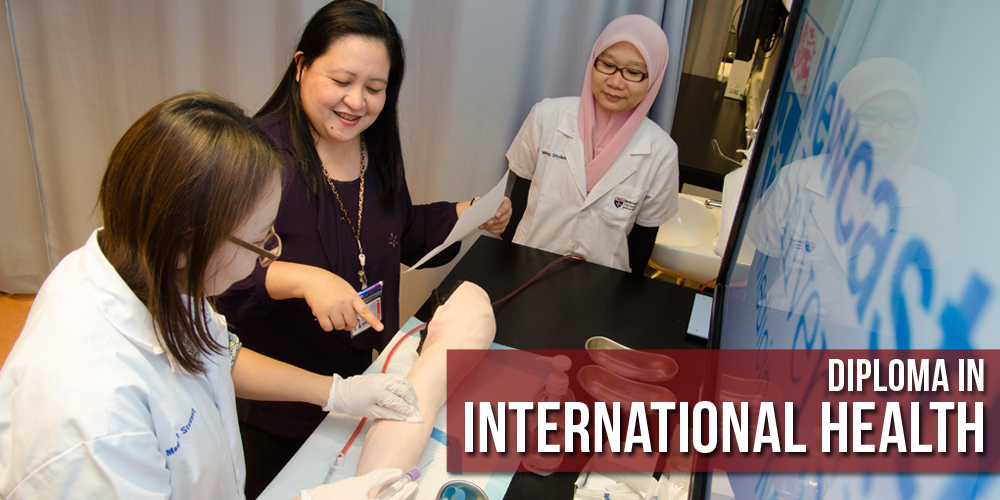
Diploma in International Health
Program Description
International health is a field focusing on public health across regional or national boundaries. It seeks to (a) understand health problems in a global context; (b) compare factors that affect the health of people in resource-poor and transitional economies around the world; and (c) develop means of disease reduction and health protection and promotion for these population.
Prospective students
- Medical and other professionals working in the field of health and development like nursing, dentistry, veterinary medicine, allied medical professions, social work and related fields.
- Intended for both entering and mid-career health professionals who are looking for graduate-level education and training that will prepare them for supervisory work in government health departments, local and international non-government organizations engaged in health and development work.
- It is particularly relevant to those who would like to pursue an academic career in international health.
- Students with international and cross-cultural interests may apply their knowledge in an appropriate area of international health studies, while also developing a particular area of expertise.
Program Goals
The program aims to develop international health professionals who are able to:
- Design health programs that address significant global health problems and issues (e.g. pandemics, industrial accidents, disasters, health effects of environmental change) that are informed by a critical understanding of the global political, economic, environmental, and cultural systems and how these relate to health and development.
- Implement services that work in a global context for health promotion and development in accordance with international and local policies, directions, and ethical standards.
- Evaluate health development programs and strategies across different settings, both local policies, directions, and ethical standards.
- Engage in effective collaboration with important international organizations as well as non government organizations for the improvement of health, taking into account the interplay of political, economic, environmental, and cultural factors in different development settings especially in middle- and low-resource countries.
- Contribute to the continuously evolving discipline of international health through research generation.
Admission Requirements
Applicants must submit:
- An official transcript of records;
- A certified true copy of the college diploma;
- An updated curriculum vitae;
- A certificate of training or employment describing the nature of the applicant’s work.
Professionals who wish to enroll in the Diploma on International Health must be:
- graduates of approved medical schools or graduates with professional training in nursing, dentistry, veterinary medicine, allied medical professions, social work and related fields, with at least a baccalaureate degree in science;
- have at least one (1) year experience or previous training in the field of public health as evidenced by a certificate of training or employment describing the nature of the applicant’s work; and
- meet other criteria set by the Admissions Committee.
A student who completes the unit requirements for the DIH program may opt to proceed to MIH upon complying with the admission requirements for MIH.
A DIH graduate may opt to graduate with the degree and seek admission into the Master’s program within three years of earning the DIH. Beyond three years, the DIH graduate must pass the qualifying examination for admission to the Master’s program.
Mode of Instruction
Courses are delivered on a semestral basis using various technologies where appropriate. The virtual classrooms run in MyPortal, the learning management system of the UPOU. This is where class announcements are made, course materials uploaded, discussions held and assignments uploaded.
Courses
Program of Study
Students are expected to take the courses in the following sequence.
| Year | First Semester | Number of Units | Second Semester | Number of Units |
|---|---|---|---|---|
| 1 | IH 201 | 3 units | IH 211 (HP) / IH 221(HSD) | 3 units |
| IH 202 | 3 units | IH 231 | 3 units | |
| BIOSTAT 201* | EPI 201* | |||
| 2 | IH 212 (HP) / IH 224 (HSD) | 3 units | IH 213 (HP) / IH 222 (HSD) | 3 units |
| IH 203 | 3 units | IH 243 | 3 units |
*BIOSTAT 201 and EPI 201 are audit courses required to be taken by freshmen
Program Policies
A student who has completed the unit requirements (24 units) for the Diploma in International Health (DIH) program may opt to graduate with the degree or proceed to the Master of International Health (MIH) Program by taking up additional 12 units (one core course, one major course, and six units of thesis) upon complying with the admission requirements for MIH and passing the Qualifying Exam. A DIH graduate may seek admission into the Master’s program within three years of earning the Diploma.
For admission related details, please visit UPOU website.

















FMDS Socials